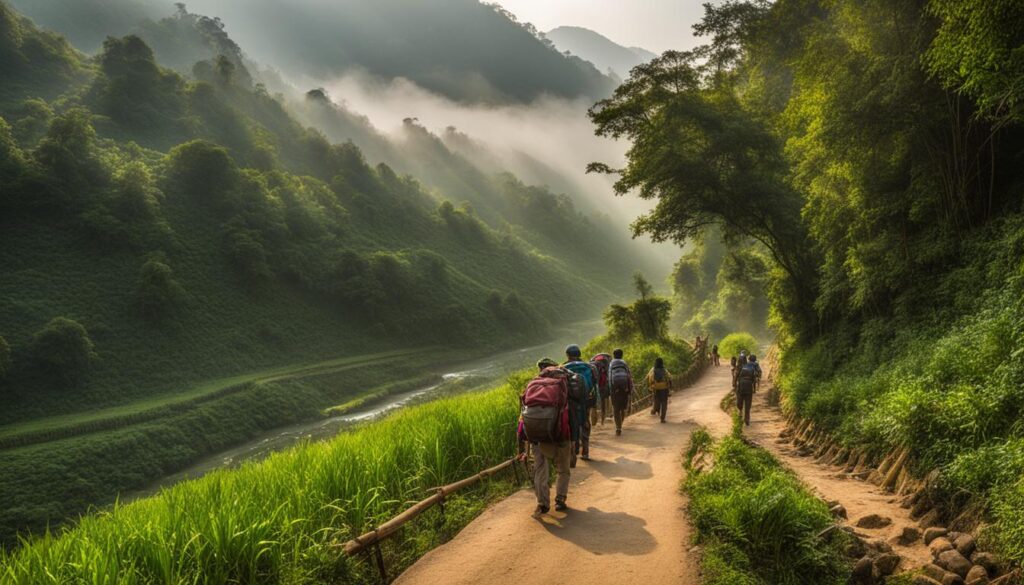If you’re planning to explore rural areas in China, the big question is: is it safe? While China is generally a safe country to visit, traveling to rural areas comes with its own set of risks and challenges.
In this article, we’ll provide you with insights and tips on how to travel safely in China’s rural areas. Whether you’re chasing off-the-beaten-path adventures or looking to experience traditional, countryside culture, we’ll help you prepare for a secure journey.
In the following sections, we’ll discuss transportation, accommodation, cultural sensitivity and respect, health and safety precautions, and communication tips that you should be aware of when exploring rural China.
So, buckle up and let’s dive in! But first, take a look at this image that captures the beauty of China’s rural landscapes:
Understanding Rural China and Off-the-Beaten-Path Adventures
China is known for its bustling cities, but its rural areas have a unique charm that is worth exploring. Rural tourism in China is growing as more travelers seek off-the-beaten-path adventures, away from the crowds and the usual tourist hotspots.
Exploring rural China offers a glimpse into traditional Chinese life, culture, and history. From idyllic countryside villages to scenic rice terraces, there are plenty of destinations to choose from. Some popular rural tourism spots include:
| Destination | Description |
|---|---|
| Xidi and Hongcun Villages | Charming, well-preserved villages with traditional Huizhou architecture |
| Jiuzhaigou National Park | Natural reserve with stunning waterfalls, lakes and ancient forests |
| Zhangjiajie National Forest Park | Inspiration for the “floating mountains” in the movie Avatar, with towering sandstone pillars, beautiful forests, and winding rivers |
| Yubeng Village | Serene and remote high mountain village, surrounded by snow-capped peaks, glaciers, and alpine forests |
As you explore rural China, you’ll experience breathtaking landscapes, unique customs, and a slower pace of life. You might even have the opportunity to stay with a local family and learn about their daily routines, traditions, and cuisine.
However, it’s important to prepare thoroughly for your trip, particularly if you plan to venture off the grid. In the next sections, we’ll discuss safety considerations, transportation tips, accommodations, cultural sensitivity, health precautions, and communication tips for your rural China adventure.
Safety Considerations for Rural Travel in China
If you’re planning to explore China’s rural areas, it’s essential to keep safety in mind. While rural travel in China can be an incredible adventure, it also comes with its own set of risks.
To ensure a safe journey, here are some safety tips for rural travel in China:
- Research your destination beforehand. Before you go, make sure to research your destination thoroughly. Understand the local customs, traditions, and laws. Familiarize yourself with the weather patterns and terrain, and choose the best time to visit.
- Stay vigilant. Whether you’re walking, biking, or driving, be aware of your surroundings at all times. Watch out for potential hazards like steep drops, unstable terrain, or dangerous wildlife.
- Stick to established trails. It’s tempting to explore off the beaten path, but in rural China, that can be risky. Stick to established trails and roads, especially if you’re traveling alone or without a local guide.
- Take appropriate precautions. Be sure to pack adequate sunscreen and insect repellent so that you can reduce the risk of sunburn, mosquito-borne diseases, and tick bites. If you’re traveling during the winter season, pack warm clothing, as temperatures can drop quickly in rural areas.
- Remain respectful and polite. It’s essential to be respectful and polite to the locals while traveling in rural China. While some traditions may seem unfamiliar, it’s best to accept and appreciate them. Stay alert to avoid offending anyone.
By following these safety tips, you can have an exciting, secure journey through rural China. However, it’s also essential to keep in mind that accidents can happen. Therefore, before you travel to rural areas in China, learn about the best travel insurance options for you and your family.
Transportation Tips for Rural China Travel
Exploring rural China can be an off-the-grid adventure, but getting around in these remote areas can present unique challenges. To navigate rural China safely and efficiently, keep these transportation tips in mind:
Hire a Local Guide
One of the best ways to explore rural China is with a local guide who knows the area and the customs of the community. A guide can help you navigate the transportation system, ensuring that you stay safe and on track during your travels.
Plan Ahead
When exploring rural areas, it’s essential to plan your transportation in advance. Research your destination and understand the available options for getting around. This may include public transportation or hiring a private driver.
Use Public Transportation with Caution
Public transportation in rural areas can be inconsistent and unreliable. If you choose to use public transportation, be prepared for delays and always exercise caution. Keep your belongings close and be aware of your surroundings.
Consider Navigating Remote Areas on Foot or Bicycle
If you’re up for an adventure, consider exploring rural China on foot or by bicycle. This can be a great way to see the countryside up close and personal, but be sure to plan your route in advance and bring plenty of supplies, including water and snacks.
Be Aware of Rural China Travel Risks
It’s important to understand the risks associated with off-the-grid travel in rural China. Avoid traveling alone, especially at night, and be cautious of pickpockets and scams. Always keep your valuables secure and be aware of your surroundings.
By following these transportation tips, you can explore rural China safely and navigate the challenges of off-the-grid travel. Remember to plan ahead, take precautions, and stay aware of your surroundings at all times.
Accommodation Options in Rural China
When exploring rural China, choosing the right accommodation is essential for a safe and enjoyable experience. Homestays, guesthouses, and farm stays are popular options that provide unique experiences and insights into local life and culture.
While these choices can be rewarding, it is important to choose reputable establishments to avoid potential rural China travel risks. It is wise to research your options, read reviews, and ask for recommendations from locals or other travelers.
Homestays offer the chance to stay with local families in their homes and experience their way of life firsthand. Guesthouses are small, family-owned hotels that provide comfortable rooms and meals. Farm stays offer visitors the opportunity to work on a farm and learn about agricultural practices.
It is important to note that amenities may be limited in rural areas, so it is best to manage your expectations accordingly. Some accommodations may not have western-style bathrooms or air conditioning. However, they offer the opportunity for an authentic cultural immersion experience.
When booking your accommodation in rural China, it is advisable to verify that the establishment prioritizes the safety and well-being of its guests, adhering to all necessary health and safety standards.
Cultural Sensitivity and Respect in Rural China
When exploring rural areas of China, it’s essential to understand and respect local customs, traditions, and etiquette. This will not only help you avoid any misunderstandings but also enable you to connect with local communities and make the most out of your trip. Here are some valuable insights for cultural sensitivity and respect in rural China:
- Be aware of cultural differences: Rural China is vastly different from western culture, and it’s important to acknowledge and respect these differences. For example, it is customary to remove shoes when entering someone’s home or temple. Eating everything on your plate is also considered a gesture of respect.
- Learn basic Mandarin phrases: While most people in tourist areas can speak basic English, learning some simple Mandarin phrases will help you connect with the locals. Greetings like “Ni hao” (hello) and “Xie xie” (thank you) will go a long way in building friendly relationships.
- Dress appropriately: Dress conservatively when visiting rural communities. Avoid revealing clothing and cover your shoulders and knees. It’s also customary to remove hats in temples and other sacred areas.
- Don’t intrude on personal space: Physical touch and public displays of affection are not common in rural China. Respect personal space and keep a safe distance, especially when interacting with the opposite gender.
By keeping these tips in mind, you’ll not only have a more enjoyable trip but also show respect for the local people and their traditions.
Health and Safety Precautions for Rural China Travel
While exploring the rural areas of China can be an exciting adventure, it’s important to take certain health and safety precautions to ensure a safe and memorable trip. Here are some tips to keep you safe during your rural China travel:
Vaccinations
Before traveling to rural China, it’s important to check with your healthcare provider to ensure your vaccinations are up-to-date. You may need to get additional vaccinations, such as hepatitis A and B, typhoid, and Japanese encephalitis, depending on your travel plans.
Food and Water Safety
One of the biggest risks to your health when traveling to rural China is contaminated food and water. To protect yourself, stick to bottled water and avoid consuming raw or undercooked meat and vegetables. While it may be tempting to try local street food, you should only eat food that has been thoroughly cooked and is still hot when served.
Insect-Borne Diseases
Insects such as mosquitoes and ticks are prevalent in rural areas of China and can carry serious diseases such as dengue fever and tick-borne encephalitis. To avoid insect bites, wear long-sleeved shirts and pants, use insect repellent, and stay in places with air conditioning or window screens.
Emergency Contact Information
Before your trip, make sure you have all necessary emergency contact information, including the contact information for the nearest hospital and your embassy or consulate. It’s also a good idea to carry a list of your medical conditions, medications, and allergies with you at all times.
By taking these health and safety precautions, you can minimize the risks associated with rural China travel and enjoy the unique experiences and cultural insights that only this region can offer.
Communication and Language Tips for Rural China Travel
Traveling in rural China can be a unique and rewarding experience, but it also poses some challenges. Communication and language barriers can be one of the most significant obstacles that travelers encounter. In this section, we’ll provide you with some tips to overcome language barriers and communicate effectively in rural areas of China.
Learn Some Basic Mandarin Phrases
Learning a few Mandarin phrases can help you navigate rural China and communicate with locals. Here are some basic phrases to get you started:
- Nǐ hǎo (你好) – Hello
- Zàijiàn (再见) – Goodbye
- Xièxiè (谢谢) – Thank you
- Bú kèqi (不客气) – You’re welcome
- Qǐngwèn (请问) – Excuse me, may I ask…
Practicing these simple phrases will demonstrate your respect for Chinese culture and help you connect with locals.
Use Translation Apps
If you’re struggling with the language barrier, try using translation apps. Most smartphones have translation apps that can help you translate conversations, street signs, and menus. Some popular apps include Google Translate, iTranslate, and Waygo. However, keep in mind that these apps may not be perfect, and you should still try to learn some basic Mandarin phrases.
Work with a Local Guide
Hiring a local guide is an excellent way to navigate rural China and overcome language barriers. A local guide can offer you insights into the local culture, help you communicate with locals, and ensure your safety. Plus, they can take you off-the-beaten-path and show you hidden gems that you might not have found on your own.
Use Gestures
If all else fails, you can use body language and gestures to communicate. Simple gestures like pointing, nodding, and waving can be effective ways to convey your message. Keep in mind that some gestures may be interpreted differently in Chinese culture, so it’s always best to do your research before using them.
By following these tips, you can overcome communication and language barriers and enjoy a successful and enjoyable trip to rural China.
Conclusion:
So, is it safe to travel to rural areas of China? The answer is yes, as long as you take the necessary precautions. Understanding rural China and its unique experiences is a must, but safety considerations should always be a top priority. Remember to research your destination beforehand, choose reputable accommodation, and take necessary health and safety precautions. Communication barriers can be overcome with basic Mandarin phrases and translation tools and always remember cultural sensitivity and respect when traveling in rural China.
By following the insights and tips provided in this article, you can have a secure and unforgettable journey in rural China.
Happy travels!

















































